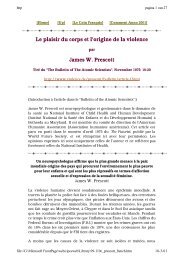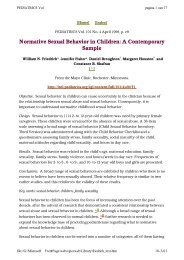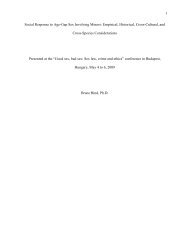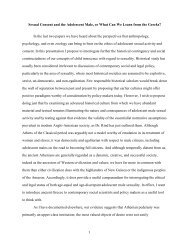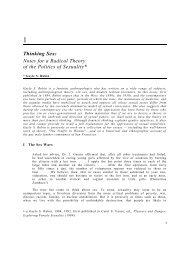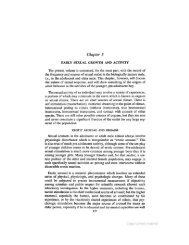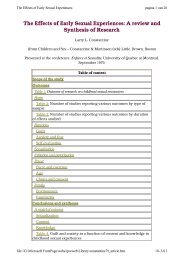PDF file - Ipce
PDF file - Ipce
PDF file - Ipce
Create successful ePaper yourself
Turn your PDF publications into a flip-book with our unique Google optimized e-Paper software.
Part_5_2<br />
Compromise is possible<br />
Without going into the complexities, I state as my position that I think a compromise position is<br />
best. In a just war, as I believe the war against Hitler to have been, we may have to accept that<br />
it is not right to set the rights of individuals above the achievement of a social goal. This is a<br />
dangerous position. Stalin also believed that brutal means were justified to achieve an<br />
ultimately better society. Whether one is justified in riding roughshod over the rights of some<br />
individuals (or merely risking that this might happen) ultimately depends on making a<br />
judgment - as well informed as possible - about the likely outcome of one's actions. The defeat<br />
of Hitler was a realizable goal; the enforced achievement by Stalin of a communist ideal society<br />
was an altogether more distant and elusive proposition.<br />
So, I believe in human rights. I believe in the right to life, liberty and the pursuit of happiness -<br />
a doctrine set out by Jefferson in the US Declaration of Independence in a sentence which on the<br />
face of things neatly appears to marry a broadly consequentialist aim with natural rights<br />
principles. In my book Paedophilia: The Radical Case I also made use of rights theory with<br />
regards to children's rights, including the right to sexual expression, in the shape of John<br />
Rawls's theory of justice, which uses an updated version of the old natural rights idea in order<br />
to resolve the tensions and incompatibilities between consequentialist and rules-based<br />
thinking.<br />
So much, then, by way of introduction to my general position and the very abstract ethical<br />
ideas I feel we can usefully apply . Now we can at last get down to the business of actually<br />
applying them to the ethics of adult-child sexual relations. I started by suggesting the Four<br />
Principles accepted as <strong>Ipce</strong> policy are rather too narrowly conceived in my view. Now we can<br />
begin to explore the basis of that claim.<br />
Back to the four principles<br />
Looking at the principles again in the light of my introduction, we might first of all notice that<br />
they are indeed principles, or rules. They are not exactly a list of do's and don'ts. They are not a<br />
rigid code like the Ten Commandments, which one is expected to obey regardless of the<br />
consequences. There is considerable scope for individual interpretation. Indeed they appear to<br />
have been drawn up with consequences in mind, namely the potential bad outcomes for a<br />
youngster if his adult friend does not exercise sexual restraint. But in one very important<br />
respect they are not consequentialist in the way I have distinguished.<br />
The consequentialist way of looking at things is to consider each case on its merits. All sets of<br />
rules and codes, and even broad principles, by contrast tend characteristically to do less than<br />
full justice to the complexities of the particular circumstances in which they are applied. This is<br />
a weakness of all rules-based ethical systems, just as failure to consider the rights of individuals<br />
is, as we have seen, a weakness of pure consequentialism in pursuit of a social goal such as the<br />
http://home.wanadoo.nl/ipce/newsletters/nl_e_12/part_5_2.htm (4 of 13) [10/16/2002 5:35:14 PM]



